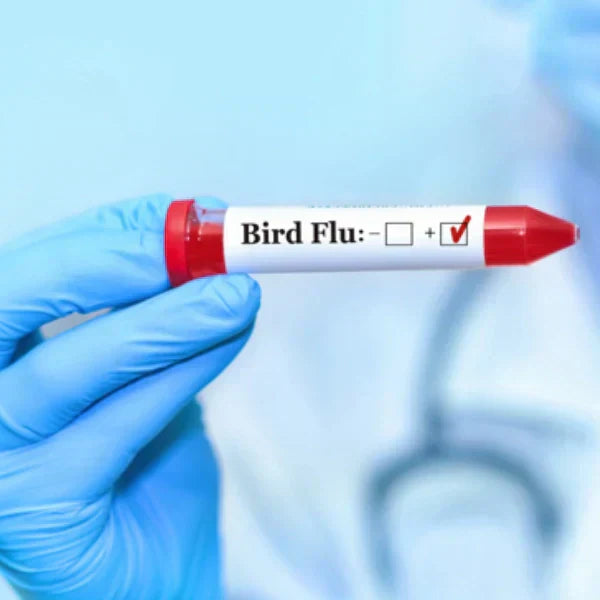While rising egg prices have sparked heated debates in U.S. politics, few people realize that bird flu is a major underlying factor. In February 2025, authorities shut down the New York live bird market after detecting several bird flu cases, raising public concern about the possibility of another viral outbreak—especially with memories of COVID-19 lockdowns still fresh. Although human-to-human transmission of bird flu has not been confirmed, around 60 human cases have already been reported.
Given these developments, it’s essential to understand how bird flu spreads and how to protect yourself. If you’re seeking reliable, science-based guidance, this article will explain the mechanisms of transmission and practical steps to reduce your risk.

What is Bird Flu or Avian Influenza?
Avian flu is caused by different strains of the Influenza A virus. Since there are several strains, they affect birds and animals differently. For instance, some cause mild or no disease in wild birds, while others severely impact the health of poultry. Similarly, mammals like seals, livestock, and humans can also get infected with the bird flu virus.
The H5N1 and H7N9 are the most recognized strains of bird flu. The former was first detected in Hong Kong in 1997 and then in 2003, when it became a cross-continent affair, spreading throughout Asia, the Americas, Europe, and Africa. The H7N9 is a relatively new strain, first discovered in eastern China in 2013. In a recent example, a major outbreak at Hickman’s Family Farms in Arizona underscored how rapidly H5N1 can devastate poultry operations in the U.S.
It is important to remember that humans are prone to disease and death from both strains of the bird flu virus.
How Do Humans Get Infected by Bird Flu?
The most concerning strains of Avian flu we should be aware of are H5N1 and H7N9. They are found in wild birds and can spread to humans if we come into prolonged and unprotected contact with them. Poultry and animals like pigs and cows can also get infected and spread the virus to humans.
To be specific, the virus spreads through nasal secretions, saliva, and animal feces. When humans and birds come into contact with the virus or touch contaminated surfaces, they are susceptible to getting infected.

Let us dig a little deeper and find out how it happens:
1. Direct Contact With Infected Birds
The most common way humans get infected with bird flu is by handling infected birds in markets, farms, or at home. Similarly, poultry farmers, slaughterhouse workers, and others involved in de-feathering or processing infected birds can also be impacted. The virus usually enters the human body through the mouth, nose, eyes, or cuts on the skin.
2. Consumption of Contaminated Poultry or Eggs
While the chances of anyone getting infected with bird flu by eating meat or eggs are very low, it is still recommended to take precautions. Proper precautions can reduce the risk of infections from meat and eggs to almost zero.
An additional detail to remember is that the United States Department of Agriculture (USDA) has been continuously inspecting poultry, meat, and egg production plants nationwide to ensure that the products hitting the shelves are completely safe for consumption.
How Serious of a Risk is Bird Flu to Humans?
There has been no person-to-person spread of Avian flu yet, and the overall risk to the public is also limited. Still, the Centers for Disease Control and Prevention (CDC) has an extensive flu surveillance system that constantly monitors influenza activity and its spread.
Recently, bird flu infections in poultry and livestock have infected workers. There are 68 cases of bird flu in the US today, 64 among workers in the dairy and poultry industry.
Since most bird flu infections result from unprotected and prolonged contact with infected animals and birds, the CDC recommends wearing personal protective equipment (PPE) to minimize the risk. This includes specialized gloves and masks that keep the virus at bay, even if you work for hours in an infected environment.
Thankfully, there have been no reports of severe influenza cases where infected people have had prolonged illness or death. One exception is an elderly Louisiana resident who died after contracting bird flu, though they also had other chronic health conditions.

Bird Flu Symptoms You Should Know
One of the most frequent questions experts get asked about bird flu is its symptoms and signs. It is worth remembering that sometimes there are no symptoms at all after you catch bird flu, and on other occasions, you may face severe illness.
Here are the usual symptoms of bird flu you should be aware of:
- Mild respiratory symptoms and flu
- Eye redness (conjunctivitis)
- Pneumonia can also result in hospitalization
- Cough and sore throat
- Runny or stuffy nose
- Feeling feverish or actual fever with a temperature of 100ºF [37.8ºC]
- Body aches, fatigue, and muscle pains
- Breathing difficulties and shortness of breath
Some less common symptoms of bird flu include vomiting, seizures, nausea, and diarrhea.

How to Prevent Bird Flu Transmission to Humans
According to experts, the number of bird flu cases reported by the CDC is low, but the actual count could be much higher. That's because most people have mild to no symptoms and never even think they have contracted the virus.
Here are some of the most effective ways to prevent the spread of bird flu and protect yourself:
1. Consume Pasteurized Dairy Products
Never compromise on the safety of the dairy products you consume, which can only be ensured with pasteurization.
Contaminated dairy products can infect humans with bird flu. Although the chances are low, as most products on the shelves are meticulously tested, they are not the same everywhere.
Either pasteurize the milk yourself or pick packaged products that are safe for consumption.
2. Thoroughly Cook Your Eggs and Meat
Birds, including poultry, are prone to avian influenza. To avoid problems, cook poultry and eggs at 165°F to kill viruses and bacteria. The CDC also recommends cooking ground beef at 160°F and whole cuts of meat at 145°F before resting them for 3 minutes.
3. Take the Bird Flu Vaccine
Prevention is far better than cure. If you can avoid contracting avian influenza, you save many of your resources and those of the healthcare system, reducing the strain on healthcare workers. You can check the Centers for Disease Control and Prevention (CDC) website to find a nearby center to get your seasonal flu vaccine and stay safe.
4. Vaccinate the Pets
Vaccination for pets is always an option to protect them from bird flu. Talk to your veterinarian to know what needs to be done.
While your pets are usually safe and don't contract bird flu easily, it is still recommended to stay vigilant. Prevent them from coming into contact with dead or sick birds when they're outside.
5. Wash Your Hands
The most effective advice for fighting any virus is washing your hands regularly. Experts recommend washing your hands with soap for at least 20 seconds. Remember to rub the back of your hand and the insides of your fingers.
Your Role in Preventing the Spread of Bird Flu
Now that you have all the information you need, you are much better positioned to protect yourself, loved ones, and the community in general from bird flu. Make sure you follow all the guidelines, such as wearing PPE, washing hands, staying away from infected spaces, and the like.
Stay informed, spread awareness, and if you smell something concerning, report it immediately to the relevant authorities.

FAQs About How Bird Flu Spreads to Humans
How does bird flu transmit from bird to bird?
Infected birds transmit the virus through feces, saliva, and mucus. When other birds come into contact with any of these elements, they are highly likely to contract avian influenza.
What is the cause of bird flu?
Bird flu is caused by the influenza A virus. The following four strains have been discovered:
- H5N1 (since 1997)
- H7N9 (since 2013)
- H5N6 (since 2014)
- H5N8 (since 2016)
Can cats transmit bird flu to humans?
Although it is rare to catch bird flu from cats, it is possible, especially if you stay in contact with an infected cat for prolonged periods. Therefore, take the necessary precautions when handling a sick cat, whether a household pet or wild.
How to treat bird flu in humans?
Antiviral medicines like oseltamivir (Tamiflu) or zanamivir (Relenza) are usually given to bird flu patients. They reduce the severity of sickness and improve the patient's overall condition. People who have contracted bird flu are also advised to stay at home.
Can consuming undercooked poultry or eggs transmit bird flu to humans?
Currently, there is no evidence that H5N1 bird flu can be transmitted to humans through properly cooked poultry or eggs. However, it’s advisable to avoid consuming undercooked or raw poultry products to minimize any potential risk. Cooking poultry and eggs to an internal temperature of 165°F (74°C) effectively kills the virus .
Is there a risk of bird flu transmission through unpasteurized dairy products?
Yes, there is a potential risk. Infected birds can transmit the virus through their feces, saliva, and mucus. If these contaminants enter the milk supply, especially in unpasteurized dairy products, there is a possibility of transmission to humans. Therefore, it’s recommended to consume only pasteurized dairy products to eliminate this risk .
How can individuals reduce their risk of contracting bird flu?
To minimize the risk of bird flu infection, individuals should:
• Avoid direct contact with sick or dead birds.
• Wear protective equipment, such as gloves and masks, when handling birds or their droppings.
• Practice good hygiene by washing hands thoroughly after any potential exposure.
• Ensure that poultry products are cooked to the recommended internal temperatures.
• Stay informed about local outbreaks and follow public health advisories




Leave a comment
All comments are moderated before being published.
This site is protected by hCaptcha and the hCaptcha Privacy Policy and Terms of Service apply.